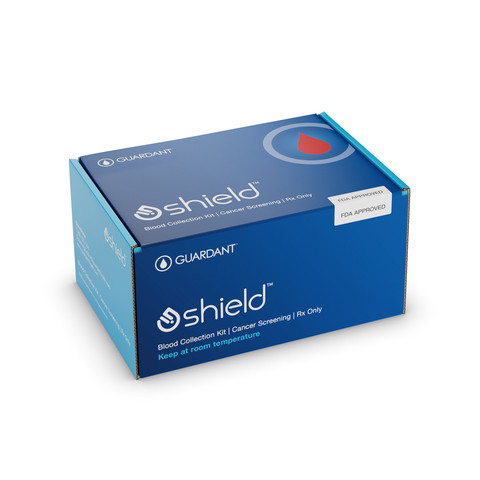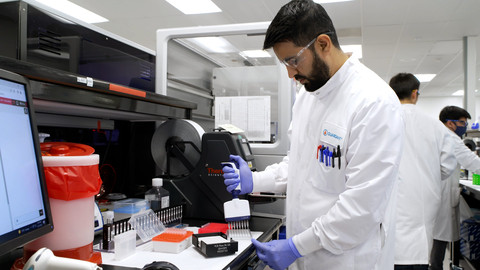Guardant Health’s Shield™ Blood Test Approved by FDA as a Primary Screening Option, Clearing Path for Medicare Reimbursement and a New Era of Colorectal Cancer Screening
Shield is first blood test approved by FDA as a primary screening option for colorectal cancer and that meets performance requirements for Medicare coverage
Blood test offers easy, convenient and pleasant screening option with potential for improving colorectal cancer screening rates
Guardant Health to host investor conference call and webcast Monday, July 29, at 8:30 a.m. ET / 5:30 a.m. PT
The CRC screening rate in the U.S. is only about 59%, which falls well below the National Colorectal Cancer Roundtable’s goal of 80% for eligible individuals.[6] More than one out of three eligible Americans - over 50 million people - do not complete CRC screening, often due to the perception that other available options, such as colonoscopy or stool-based tests, are invasive, unpleasant or inconvenient.[7]
“The persistent gap in colorectal cancer screening rates shows that the existing screening options do not appeal to millions of people,” said Daniel Chung, MD, gastroenterologist at Massachusetts General Hospital and Professor of Medicine at Harvard Medical School. “The FDA's approval of the Shield blood test marks a tremendous leap forward, offering a compelling new solution to close this gap. This decision will help make screening tests more broadly accessible and propel blood-based testing and CRC screening into a new era. With increased screening rates and early cancer detection, many more lives can be saved.”
The Shield blood test is the result of over 10 years of research and development, including collaboration between Guardant Health and leading health organizations globally. Since the commercial introduction of the LDT (laboratory developed test) version in May 2022, the overall adherence rate for the Shield test has been more than 90%, meaning more than 90% of patients who were prescribed the test in a real-world clinical setting completed it.[8] In contrast, studies show only 28-71% of patients who are prescribed other screening methods, such as colonoscopy or a stool test, complete them.[9]-[12] Primary care physicians can have patients complete a Shield test with a simple blood draw during a routine office visit, providing a convenient and more pleasant alternative screening method that doesn’t require the special preparation, dietary changes, time and discomfort associated with colonoscopy or the unpleasantness of handling stool.
“The FDA approval of the Shield test is a significant victory for patients and an important milestone in Guardant Health’s mission to conquer cancer with data. Shield can help improve colorectal cancer screening rates so we can detect more cancers at an early stage, when they are treatable,” said AmirAli Talasaz, Guardant Health co-CEO. “We are now getting ready to launch this test in the near future and are very excited to empower physicians with a viable blood-based screening option to tailor the screening regimen to the unique needs of their patients.”
The FDA decision follows a strong recommendation for approval by an Advisory Committee panel in May 2024. The approval was based on results of ECLIPSE, a 20,000+-patient registrational study evaluating the performance of the test for detecting CRC in average-risk adults. Designed to reflect the diverse population of the U.S., the study was conducted at more than 200 clinical trial sites in rural and urban communities across 37 states. Results from the study, published in the March 14, 2024, issue of The New England Journal of Medicine, showed that Shield demonstrated 83% sensitivity for the detection of CRC, with 90% specificity for advanced neoplasia. This performance is within range of current guideline-recommended non-invasive screening methods, in which overall CRC sensitivity ranges from 74% to 92%.[13]
“In addition to performance, a screening test’s value should be measured by how accessible it is, and how likely people are to use it,” said Michael Sapienza, CEO of the Colorectal Cancer Alliance. “Guardant Health’s Shield test checks all three of these boxes and is truly a welcomed addition to the screening options currently available. Giving people choice, and offering a blood test that can reach those in harder-to-screen communities, will undoubtedly be a huge step forward in our battle against colorectal cancer.”
“This is a promising step toward making more convenient tools available to detect colorectal cancer early while it is more easily treated,” said William M. Grady, MD, a gastroenterologist at Fred Hutchinson Cancer Center. “The test, which has an accuracy rate for colon cancer detection similar to stool tests used for early detection of cancer, could offer an alternative for patients who may otherwise decline current screening options.”
“Most people in my situation know we’re supposed to get screened for colon cancer,” said Dennis Barnes, a 55-year-old attorney whose physician had recommended a colonoscopy. But despite his best intentions, he had never scheduled one. “It’s hard to find the time to schedule it if you have a busy life and a demanding job,” he said. When his doctor told him about Shield, he agreed to have the blood test and was fortunate to have the result come back normal. “I realized I had taken quite a risk by waiting so long to screen. The Shield test is a much more pleasant way to screen, and the convenience of it makes getting screened pretty much a no-brainer.”
“I was in for a routine physical and my doctor asked when I had my last colonoscopy,” said John Gormly, a 77-year-old business executive in Newport Beach, California. “I said it's been a long time, so he offered to give me the Shield blood test. A few days later the result came back positive, so he referred me for a colonoscopy. It turned out I had stage II colon cancer. The tumor was removed, and I recovered very quickly. Thank God I had taken that blood test.”
Shield is available for eligible individuals by prescription through a doctor or other healthcare professional and is expected to be covered for eligible Medicare beneficiaries. Commercial insurance coverage for patients eligible for CRC screening will continue to expand following anticipated future guideline inclusion by the American Cancer Society and the U.S. Preventive Services Task Force (USPSTF).
For complete product information about the Shield blood test for CRC screening, including full safety information, visit ShieldCancerScreen.com.
Webcast Details
Guardant Health will host an investor conference call and webcast Monday, July 29, at 8:30 a.m. ET / 5:30 a.m. PT to discuss the FDA approval for Shield. A link to live audio of the webcast will be available on the “Investors” section of the company website at investors.guardanthealth.com or directly at this link. The webcast will be archived and available for replay after the event.
About Shield
Shield is a non-invasive, blood-based screening test that detects alterations associated with colorectal cancer in the blood. It is intended as a screening test for individuals at average risk for the disease, age 45 or older, and is not intended for individuals at high risk for colorectal cancer. The Shield test can be considered in a manner similar to guideline-recommended non-invasive CRC screening options and can be completed during any healthcare visit. A positive Shield result raises concern for the presence of colorectal cancer or advanced adenoma and the patient should be referred for colonoscopy evaluation.
About Guardant Health
Guardant Health is a leading precision oncology company focused on guarding wellness and giving every person more time free from cancer. Founded in 2012, Guardant is transforming patient care and accelerating new cancer therapies by providing critical insights into what drives disease through its advanced blood and tissue tests, real-world data and AI analytics. Guardant tests help improve outcomes across all stages of care, including screening to find cancer early, monitoring for recurrence in early-stage cancer, and treatment selection for patients with advanced cancer. For more information, visit guardanthealth.com and follow the company on LinkedIn, X (Twitter) and Facebook.
Forward-Looking Statements
This press release contains forward-looking statements within the meaning of federal securities laws, including statements regarding the potential utilities, values, benefits and advantages of Guardant Health’s liquid biopsy tests or assays, which involve risks and uncertainties that could cause the actual results to differ materially from the anticipated results and expectations expressed in these forward-looking statements. These statements are based on current expectations, forecasts and assumptions, and actual outcomes and results could differ materially from these statements due to a number of factors. These and additional risks and uncertainties that could affect Guardant Health’s financial and operating results and cause actual results to differ materially from those indicated by the forward-looking statements made in this press release include those discussed under the captions “Risk Factors” and “Management’s Discussion and Analysis of Financial Condition and Results of Operation” and elsewhere in its Annual Report on Form 10-K for the year ended December 31, 2023, and any current and periodic reports filed with or furnished to the Securities and Exchange Commission thereafter. The forward-looking statements in this press release are based on information available to Guardant Health as of the date hereof, and Guardant Health disclaims any obligation to update any forward-looking statements provided to reflect any change in its expectations or any change in events, conditions, or circumstances on which any such statement is based, except as required by law. These forward-looking statements should not be relied upon as representing Guardant Health’s views as of any date subsequent to the date of this press release.
References
1. The Shield test meets performance requirements for Medicare coverage under NCD 210.3.
2. American Cancer Society. Key Statistics for Colorectal Cancer. Accessed online May 8, 2023. https://www.cancer.org/cancer/types/colon-rectal-cancer/about/key-statistics.html
3. American Cancer Society. Cancer Facts & Figures 2024. Atlanta: American Cancer Society; 2024.
4. Doubeni, C, et al. Modifiable Failures in the Colorectal Cancer Screening Process and Their Association with Risk of Death. Gastroenterology. 2019 Jan; 156(1): 63-74.e6.
5. American Society of Clinical Oncology. Colorectal Cancer: Statistics. https://www.cancer.net/cancer-types/colorectal-cancer/statistics#. Accessed April 23, 2024.
6. American Cancer Society National Colorectal Cancer Roundtable. 80% in Every Community. https://nccrt.org/our-impact/80-in-every-community/. Accessed February 15, 2024.
7. Rich T, Raymond V, Lang K. Where are we today? Efforts to understand strategies and barriers to physician issuance of a recommendation for colorectal cancer screening: a systematic review. Gastroenterology. 2020;158(6 suppl 1):S-918. doi:10.1016/S0016-5085(20)32981-4.
8. Raymond V, Foster G, Hong Y et al. Implementation of Blood-Based Colorectal Cancer Screening: Real-World Clinical Experience. ACG 2023 Annual Scientific Meeting Abstracts. Vancouver, BC, Canada: American College of Gastroenterology.
9. Denberg TD, Melhado TV, Coombes JM, et al. Predictors of nonadherence to screening colonoscopy. J Gen Intern Med. 2005;20(11):989-995.
10. Gellad ZF, Stechuchak KM, Fisher DA, et al. Longitudinal adherence to fecal occult blood testing impacts colorectal cancer screening quality. Am J Gastroenterol. 2011;106(6):1125-1134.
11. Inadomi JM, Vijan S, Janz NK, et al. Adherence to colorectal cancer screening: a randomized clinical trial of competing strategies. Arch Intern Med. 2012;172(7):575-582.
12. Exact Sciences. Third quarter 2019 webcast and conference call. Updated October 29, 2019. Accessed December 17, 2021. https:/investor.exactsciences.com/investor-relations/events-and-presentations/event-details/2019/Third-Quarter-2019-Webcast-Conference-Call/default.aspx
13. Chung DC, Gray DM, Singh H et al. A Cell-free DNA Blood-Based Test for Colorectal Cancer Screening. N Engl J Med 2024;390:973-83.
View source version on businesswire.com: https://www.businesswire.com/news/home/20240725240089/en/
Website: https://guardanthealth.com/
Contact
Guardant Health, Inc.
Investor Contact
Zarak Khurshid
investors@guardanthealth.com
Media Contact
Mike Weist
+1 317-371-0035
press@guardanthealth.com
This news is a press release provided by Guardant Health, Inc..





